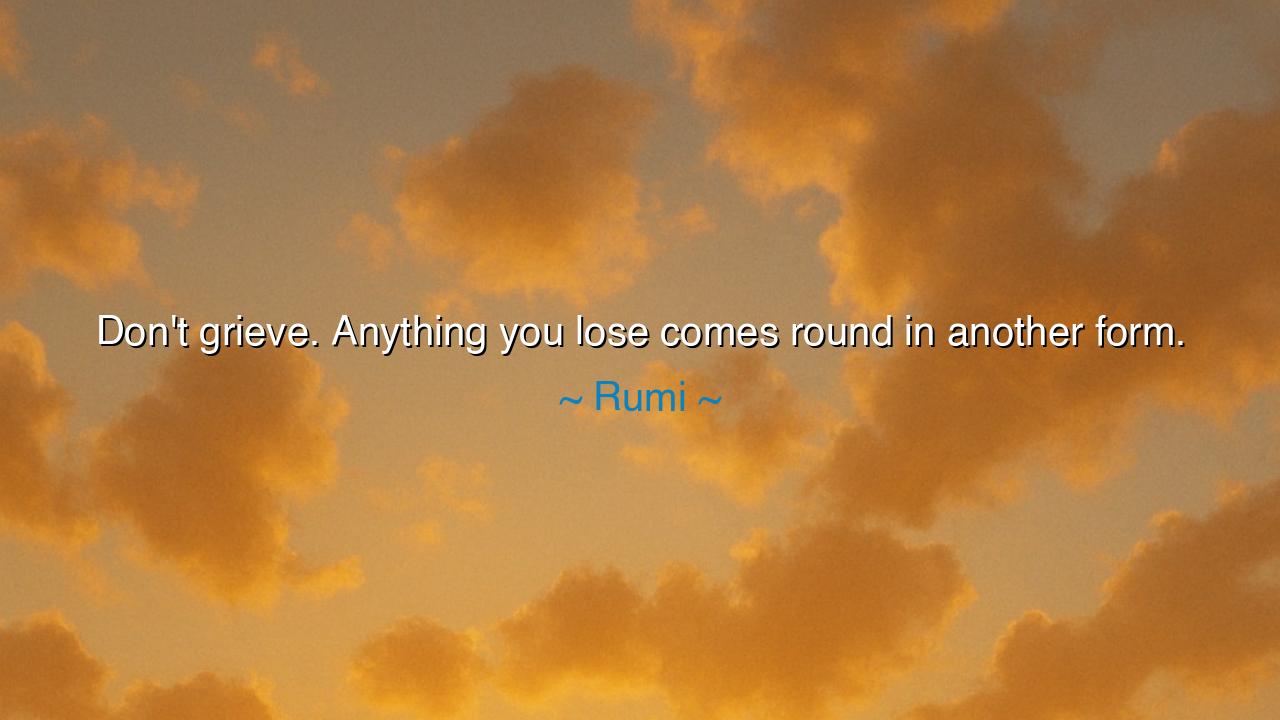
Don't grieve. Anything you lose comes round in another form.






The mystic poet Rumi once wrote, “Don’t grieve. Anything you lose comes round in another form.” These words, like sunlight filtered through the heart, speak to one of the deepest mysteries of existence — the eternal rhythm of loss and renewal. Born in the thirteenth century, in an age of turmoil and change, Jalal ad-Din Rumi witnessed suffering, exile, and the passing of beloved friends. Yet through the furnace of his grief, he discovered a sacred truth: that nothing in this world truly perishes, but only transforms, returning to us in new and wondrous ways.
When Rumi speaks of loss, he does not deny its pain. He knew well the ache of separation — the death of his beloved teacher, Shams of Tabriz, left him shattered, and from that wound came his greatest poetry. But rather than drown in sorrow, Rumi saw that grief itself was a veil that, when lifted, revealed transformation. The friend who was lost became the inspiration that illuminated his soul. The love that seemed to vanish returned as divine presence. Through his tears, he learned that the universe is a circle, not a line — and that what departs in one form will one day return in another.
This teaching was not born of mere philosophy, but of lived experience — of the deep spiritual vision that comes only to those who have walked through fire. Rumi’s Sufi faith taught that all creation flows from the same divine source, and therefore nothing is ever truly lost. The body may change, the circumstances may fade, but the essence — the soul, the energy, the love — remains eternal, reshaping itself through time and form. Thus, to grieve endlessly is to misunderstand the dance of existence. What leaves us is not gone; it is simply changing its garment before returning in another guise.
The ancients, too, spoke of this law. In Greece, the philosopher Heraclitus taught that all things flow and transform — that the river of life is never still, yet always one. In the East, the Buddha taught impermanence — that attachment breeds sorrow because we cling to what is meant to move. And yet, both in East and West, the wise agreed with Rumi’s vision: life is never destruction, but transformation. The leaf that falls from the tree does not die; it becomes the soil that feeds the next spring’s bloom. The love we think we lose returns in a new face, a new dawn, a new chance to begin again.
Consider the story of Helen Keller, who lost both sight and hearing as a child — a loss that could have condemned her to silence and despair. Yet through that very loss, she found a greater gift: the awakening of her inner sight, her boundless empathy, her voice of wisdom that spoke to millions. The senses she lost came back to her “in another form” — as understanding, faith, and inner vision. Like Rumi’s teaching, her life proves that loss can be the first stage of transformation, that grief, when embraced, becomes the seed of greatness.
To live by Rumi’s wisdom, then, is to trust in the unseen workings of the universe — to let go with faith, not fear. When love departs, when dreams dissolve, when fortune fades, we are called not to despair, but to watch with patient eyes for what new form life will take. For everything that leaves creates space for something else to enter. To resist change is to remain trapped in sorrow; to accept it is to find peace. The wise do not cling to what is passing; they open their hands to receive what is coming.
And yet, this teaching is not a call to indifference. Rumi does not say, “Do not love,” but rather, “Love so deeply that even when it changes, you recognize it still.” Grieve, yes — but grieve with the understanding that grief itself is a doorway, not a prison. The love that fades in this life may return in another — as wisdom, as kindness, as strength. To live in this awareness is to live without fear, for loss then becomes not an ending, but a transformation — the soul’s way of learning to expand.
So, my children of tomorrow, remember this: what you lose is never truly lost. The friend, the love, the dream — they will return in another form, if you keep your heart open to see it. When pain comes, let it refine you, not break you. When endings arrive, honor them as beginnings in disguise. For as Rumi teaches, grief and joy are but two halves of one circle, and the hand that takes from you today will give again tomorrow. Trust the cycle. Accept the flow. And know that in the great rhythm of life, nothing is gone — everything transforms, everything returns.






AAdministratorAdministrator
Welcome, honored guests. Please leave a comment, we will respond soon